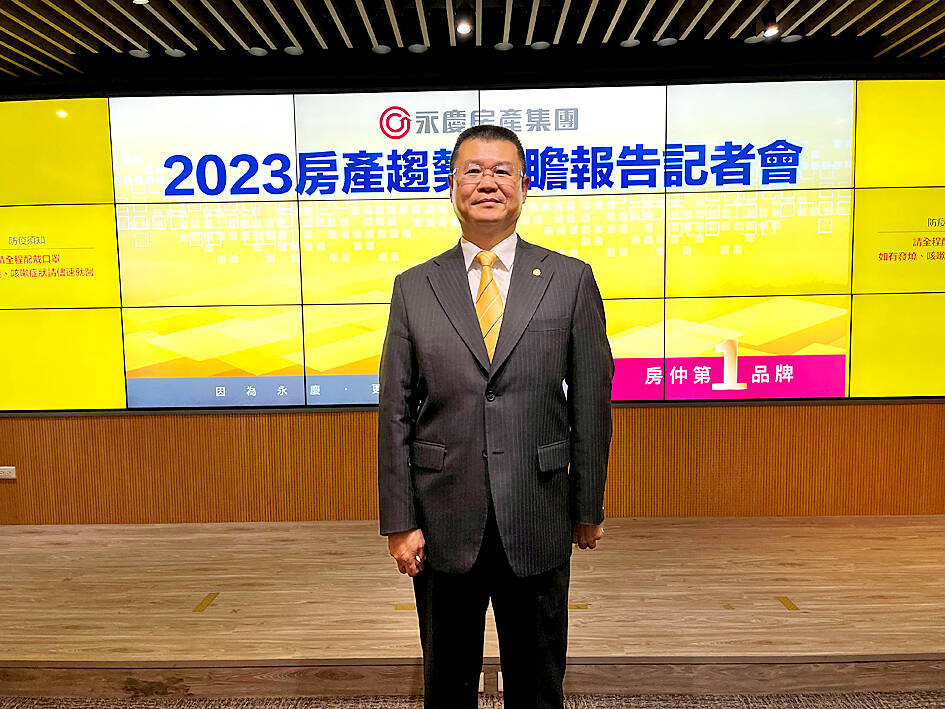Taiwanese have regained confidence in the property market, as slightly more people expect housing prices to rise next quarter, while fewer people expect price corrections, a quarterly survey released yesterday by Evertrust Rehouse Co (永慶房屋) showed.
Thirty-four percent of survey respondents expected housing prices to increase in the coming three months, 5 percentage points higher than the preceding quarter, as recent rallies in the local bourse and sustained inflation eased a bleak outlook, Evertrust research manager Daniel Chen (陳賜傑) said.
Meanwhile, the percentage of people who expected price declines fell 7 percentage points quarter-on-quarter to 33 percent, while another 33 percent held a neutral view, the survey showed.

Photo: Hsu Yi-ping, Taipei Times
While major central banks have maintained their monetary tightening policies, they have eased the pace of interest rate hikes to reduce their effects on the economy, Chen said.
Still, the local and global economies would remain weak for the rest of the year, limiting room for upside development, the analyst said.
About 90 percent of respondents said it would be difficult for Taiwan’s economy to regain traction as exports have contracted for nine straight months and the situation might not improve any time soon, Chen said.
Against that backdrop, the nation’s largest house broker by number of outlets is looking at a 20 percent decline in property transactions in the first half of this year to 140,000, compared with the 22 percent drop it projected in March.
Housing prices would hold firm after a moderate rebound of 0.8 to 4.2 percent in the nation’s seven major cities, Evertrust general manager Yeh Ling-chi (葉凌棋) said, citing an internal survey.
Hsinchu overtook New Taipei City as the city with the second-highest median presale housing prices, which has soared 1.36 times in the past five years, Yeh said.
Median presale housing prices in Taipei remain the most expensive at NT$29.8 million (US$964,713) per unit, Yeh said, adding that two-bedroom apartments would likely continue to be the mainstream products in light of decreases affordability and population.

TAKING STOCK: A Taiwanese cookware firm in Vietnam urged customers to assess inventory or place orders early so shipments can reach the US while tariffs are paused Taiwanese businesses in Vietnam are exploring alternatives after the White House imposed a 46 percent import duty on Vietnamese goods, following US President Donald Trump’s announcement of “reciprocal” tariffs on the US’ trading partners. Lo Shih-liang (羅世良), chairman of Brico Industry Co (裕茂工業), a Taiwanese company that manufactures cast iron cookware and stove components in Vietnam, said that more than 40 percent of his business was tied to the US market, describing the constant US policy shifts as an emotional roller coaster. “I work during the day and stay up all night watching the news. I’ve been following US news until 3am

UNCERTAINTY: Innolux activated a stringent supply chain management mechanism, as it did during the COVID-19 pandemic, to ensure optimal inventory levels for customers Flat-panel display makers AUO Corp (友達) and Innolux Corp (群創) yesterday said that about 12 to 20 percent of their display business is at risk of potential US tariffs and that they would relocate production or shipment destinations to mitigate the levies’ effects. US tariffs would have a direct impact of US$200 million on AUO’s revenue, company chairman Paul Peng (彭雙浪) told reporters on the sidelines of the Touch Taiwan trade show in Taipei yesterday. That would make up about 12 percent of the company’s overall revenue. To cope with the tariff uncertainty, AUO plans to allocate its production to manufacturing facilities in

Six years ago, LVMH’s billionaire CEO Bernard Arnault and US President Donald Trump cut the blue ribbon on a factory in rural Texas that would make designer handbags for Louis Vuitton, one of the world’s best-known luxury brands. However, since the high-profile opening, the factory has faced a host of problems limiting production, 11 former Louis Vuitton employees said. The site has consistently ranked among the worst-performing for Louis Vuitton globally, “significantly” underperforming other facilities, said three former Louis Vuitton workers and a senior industry source, who cited internal rankings shared with staff. The plant’s problems — which have not

COLLABORATION: Given Taiwan’s key position in global supply chains, the US firm is discussing strategies with local partners and clients to deal with global uncertainties Advanced Micro Devices Inc (AMD) yesterday said it is meeting with local ecosystem partners, including Taiwan Semiconductor Manufacturing Co (TSMC, 台積電), to discuss strategies, including long-term manufacturing, to navigate uncertainties such as US tariffs, as Taiwan occupies an important position in global supply chains. AMD chief executive officer Lisa Su (蘇姿丰) told reporters that Taiwan is an important part of the chip designer’s ecosystem and she is discussing with partners and customers in Taiwan to forge strong collaborations on different areas during this critical period. AMD has just become the first artificial-intelligence (AI) server chip customer of TSMC to utilize its advanced